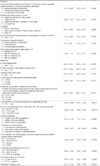1. Byun YW. An study on the use of long-term home care service in agricultural districts. Korean Soc Secur Stud. 2010. 26(3):283–308.
2. Choe EH. A study on strategic proposal for improving of service quality management system of long-term care (LTC). J Korean Gerontol Soc. 2010. 30(2):401–419.
3. Choi ID, Lee SL, Lee JM. Projection of long-term care insurance: Beneficiary and, personnel and facility. Korean Soc Secur Stud. 2010. 26(2):375–400.
4. Chung SH, Sohn CM. Nutritional status of hospitalized geriatric patients using by the mini nutritional assessment. Korean J Community Nutr. 2005. 10(5):645–653.
5. Guigoz Y. The Mini Nutritional Assessment (MNA) review of the literature. J Nutr Health Aging. 2006. 10(6):466–485.
6. Kim CH. A comparative study on Long-term Care Insurance System for the Elderly In Germany, Japan and Korea. 2009. Dankook University;19–43. Dissertation.
7. Korea National Statistical Office. The statistics of estimated future population. 2010. cited 2011 February 15. Available from
http://www.index.go.kr.
8. Korean society for the study of obesity. Koreans obesity treatment guidelines. 2009. cited 2012 November 30. Available from
http://www.kosso.or.kr.
9. Kuzuya M, Kanda S, Koike T, Suzuki Y, Satake S, Iguchi A. Evaluation of mini-nutritional assessment for Japanese frail elderly. Nutrition. 2005. 21(4):498–503.
10. Kwon MY, Lim JY, Lee YW, Kim HS. A study of nurses' perception of the visiting nursing services of long-term care insurance. J Korean Acad Public Health Nurs. 2010. 24(1):5–18.
11. Kim SH, Park CY, Nam CM. Related factor of in-home service utilization in Korean long-term care insurance among certificated elderly living alone. Health Soc Sci. 2011. 29:237–258.
12. Kwon JH, Han EJ, Kang IO. A analysis of relationships among quality, satisfaction and purchase intention perceived by home help service users. J Korean Gerontol Soc. 2010. 30(2):355–368.
13. Kwon SH, Park JR, Lee YK. A study on the elder care facility workers' attitude towards senior citizens and on the perception towards long-term care insurance system for senior citizens. J Korean Soc Dent Hyg. 2010. 10(5):905–915.
14. Lee HO, Lee JS, Shin JW, Lee GJ. Nutrition assessment of older subjects in a health care center by MNA (Mini Nutritional Assessment). J Korean Diet Assoc. 2010. 16(2):122–132.
15. Lee MJ. The status and problem educating care giver in Korea. J Soc Occup Ther Aged Dement. 2008. 2(1):69–74.
16. Lee MJ. A study on measurement issue of the quality of long-term care services for older adults. Soc Welf Policy. 2011. 38(1):141–165.
17. Lim JG. A study on factors of elderly home and community care service utilization. 2009. Baekseok University;193–234.
19. Nam YJ. A study on the improvement of long-term care insurance for senior citizen in Korea. 2009. Kwandong University;1–19. Dissertation.
20. National Health Insurance Corporation. The statistics of Long Term Care Insurance Service. 2010. cited 2011 February 15. Available from
http://www.nhic.or.kr/.
21. Nestle Nutrition Institute. MNA® Mini Nutritional Assessment. 2010. cited 2011 December 12. Available from
http://www.mna-elderly.com/.
22. Pack CJ. Cost-effectiveness analysis of long term care services : Care in institutions vs in-home. J Welf Aged. 2010. 50:145–172.
23. Park JH. Influence of service quality on service satisfaction in the long-term care service at home: Centered on home help service. Soc Welf Policy. 2011. 38(1):227–246.
24. Park JI, Joo JH. Policy suggestions for the development of Korea's national longtermcare insurance program: With special emphasis on the careworker-educating institutions. J Soc Sci. 2009. 29:17–35.
25. Seoh YH, Kim MW. A study on the improvement of visiting care with the introduction of the elderly long term care insurance system. Korean J 21Century Soc Welf. 2010. 7(2):213–239.
26. Sunwoo D. An improvement plan for the government policy on long-term care insurance. Health Welf Policy Forum. 2010. 16–24.
27. Vellas B, Guigoz Y, Garry PJ, Nourhashemi F, Bennahum D, Lauque S, Albarede JL. The mini nutritional assessment (MNA) and its use in grading the nutritional state of elderly patients. Nutrition. 1999. 15(2):116–122.







 PDF
PDF ePub
ePub Citation
Citation Print
Print






 XML Download
XML Download